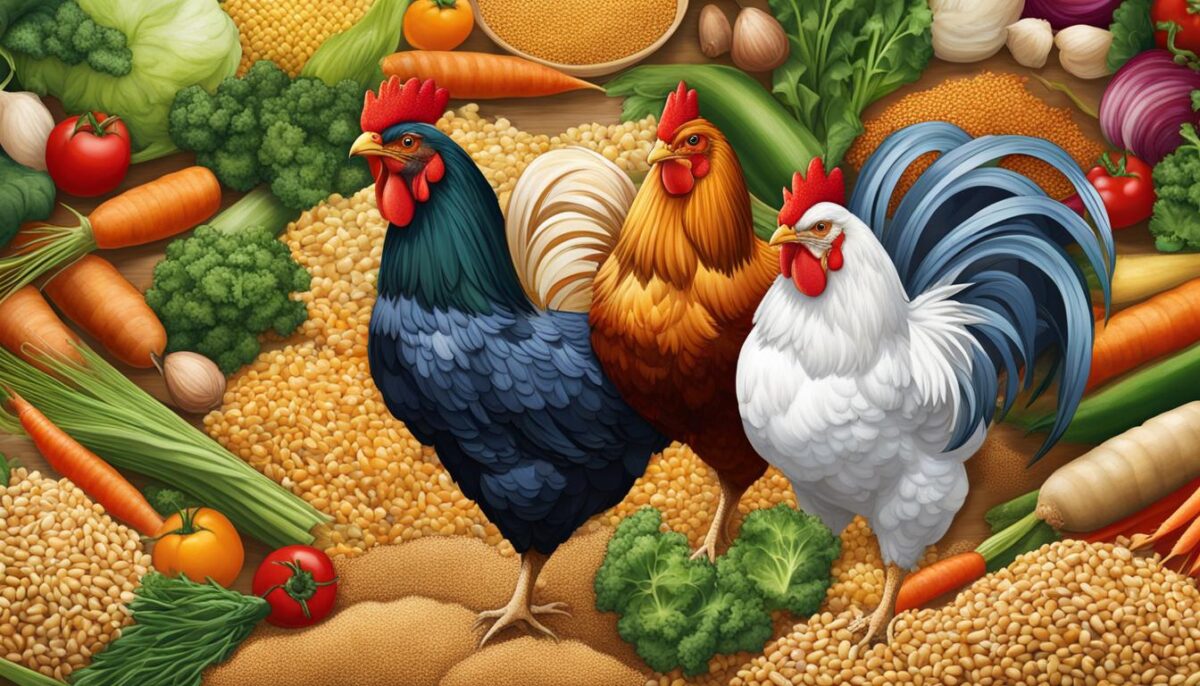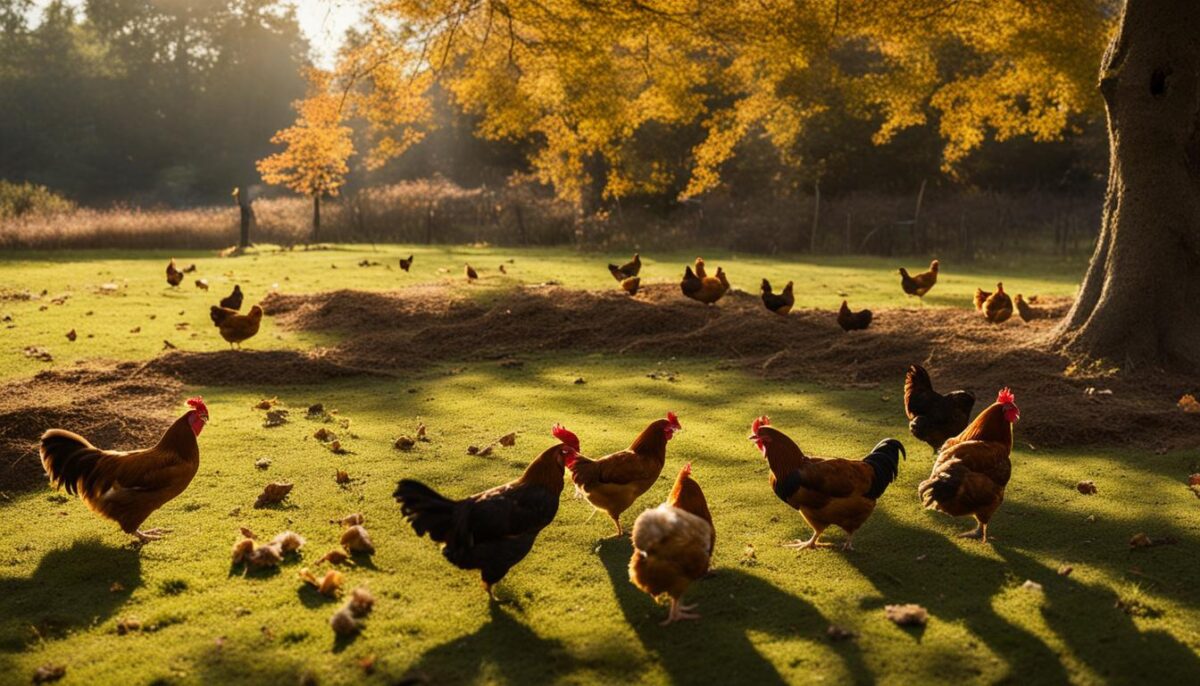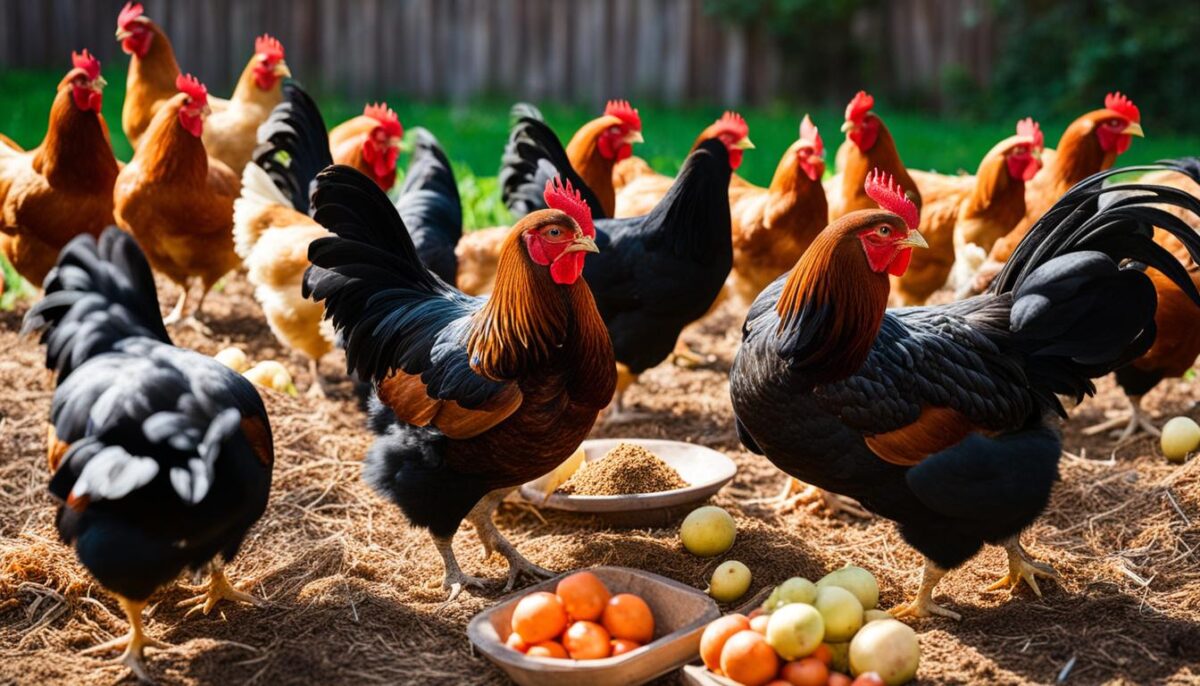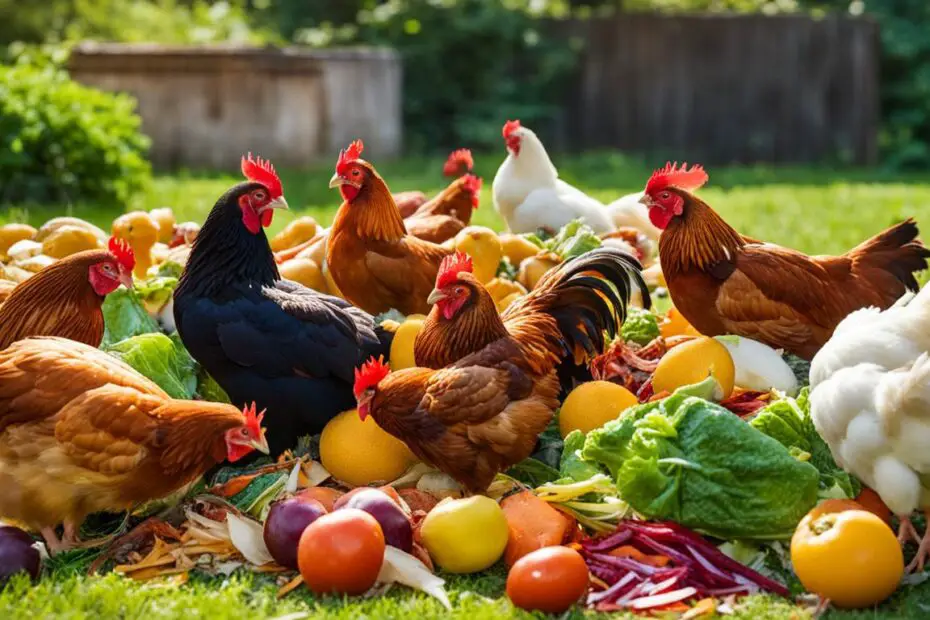Feeding kitchen scraps to chickens is a common practice that can prevent food waste and provide additional nutrients to your flock. However, it is important to remember that a chicken’s diet should primarily consist of high-quality feed. Kitchen scraps should only be given in moderation and should not exceed 10% of their daily diet. It is also important to offer clean water and grit for proper digestion.
Some safe kitchen scraps for chickens include bread, cooked meats, fruits, grains, greens, squash, starches, and vegetables. However, there are also foods that should be avoided, such as alcohol, avocado skins and pits, caffeine, chocolate, nightshade leaves, processed foods, salt, spoiled foods, raw meat, and raw potato peels.
Key Takeaways:
- Feeding kitchen scraps to chickens should be done in moderation and not exceed 10% of their daily diet.
- Safe kitchen scraps for chickens include bread, cooked meats, fruits, grains, greens, squash, starches, and vegetables.
- Avoid giving chickens alcohol, avocado skins and pits, caffeine, chocolate, nightshade leaves, processed foods, salt, spoiled foods, raw meat, and raw potato peels.
- Offer clean water and grit for proper digestion.
- Remember to prioritize high-quality feed as the main component of a chicken’s diet.
What Scraps Can Chickens Eat
When to Feed Kitchen Scraps to Chickens
Feeding kitchen scraps to chickens is a great way to provide them with additional nutrients and prevent food waste. However, it is important to introduce scraps into their diet at the appropriate age. It is recommended to wait until your chickens reach 3-4 months of age before offering them kitchen scraps. During this time, they are going through their growth phase and have specific nutritional needs that are best met with a well-balanced diet of high-quality feed.
Young chicks require a higher protein content in their feed to support proper growth and development. Too many treats or kitchen scraps can cause an imbalance in their diet and affect their growth. Therefore, it is important to prioritize their regular feed and offer kitchen scraps in moderation to ensure they receive the necessary nutrients.what scraps can chickens eat
When introducing kitchen scraps, make sure to provide clean water and appropriate grit. Clean water is essential for hydration, while grit helps with the digestion of fibrous materials in their diet. By following these guidelines, you can ensure that your chickens receive a balanced diet while enjoying the occasional kitchen scrap treat.
When to Feed Kitchen Scraps to Chickens
| Age | Feeding Recommendation |
|---|---|
| 0-3 months | Focus on high-quality starter-grower feed |
| 3-4 months | Introduce kitchen scraps in moderation |
| 4+ months | Continued moderation of kitchen scraps with a well-balanced diet of feed |
Remember, kitchen scraps should never make up more than 10% of a chicken’s daily diet. It is important to prioritize their regular feed and offer a variety of safe scraps to maintain a healthy and balanced diet for your flock. By providing kitchen scraps at the appropriate age and in moderation, you can ensure that your chickens enjoy the benefits of both their regular feed and the occasional treat. chicken feed scraps
Safe Kitchen Scraps for Chickens
When it comes to feeding your chickens kitchen scraps, there are several safe options that can provide them with healthy treats. These scraps can be given to chickens in moderation, supplementing their regular feed and adding variety to their diet. Some chicken-friendly scraps include:
- Bread (non-moldy)
- Cooked meats (cut into small pieces)
- Fruits (such as apples, berries, tomatoes, and cucumbers)
- Grains (rice, wheat, oatmeal)
- Greens (lettuce, kale, chard, carrot greens, spinach)
- Squash (winter and summer varieties)
- Starches (cooked, raw, or dried corn, peas, potatoes)
- Vegetables (broccoli, Brussels sprouts, cabbage)
These kitchen scraps provide a range of nutrients and can be a great way to use up leftovers while keeping your chickens happy and healthy. However, it’s important to remember that these treats should not exceed 10% of their daily diet. The majority of their diet should still consist of high-quality feed that provides them with all the necessary nutrients.
| Scrap | Nutritional Benefits |
|---|---|
| Bread (non-moldy) | Carbohydrates for energy |
| Cooked meats (cut into small pieces) | Protein for muscle development |
| Fruits (such as apples, berries, tomatoes, and cucumbers) | Vitamins and antioxidants |
| Grains (rice, wheat, oatmeal) | Fiber and energy |
| Greens (lettuce, kale, chard, carrot greens, spinach) | Vitamins, minerals, and antioxidants |
| Squash (winter and summer varieties) | Carotenoids for vibrant feathers |
| Starches (cooked, raw, or dried corn, peas, potatoes) | Energy and essential minerals |
| Vegetables (broccoli, Brussels sprouts, cabbage) | Vitamins, fiber, and antioxidants |
Remember to always offer clean water and grit for proper digestion when feeding kitchen scraps to your chickens. By providing them with a balanced diet that includes safe scraps as treats, you can keep your flock healthy and happy.
Foods to Avoid Feeding Chickens
When it comes to feeding your chickens kitchen scraps, there are certain foods you should avoid to ensure their health and well-being. These foods can be toxic or harmful to chickens and should never be included in their diet. It’s important to be aware of these foods and take the necessary precautions to keep them away from your flock. scrap food for chickens
Table: Foods to Avoid Feeding Chickens
| Food | Reason to Avoid |
|---|---|
| Alcohol | Can cause intoxication, liver damage, and other health issues |
| Avocado skins and pits | Contain persin, a toxin that can be fatal to chickens |
| Caffeine | Can cause hyperactivity, increased heart rate, and other health problems |
| Chocolate | Contains theobromine, which is toxic to chickens |
| Nightshade leaves | Leaves from plants like tomatoes, potatoes, eggplants, and peppers can be toxic |
| Processed foods | Often contain chemicals and additives that are harmful to chickens |
| Salt | High salt content can lead to dehydration and other health issues |
| Spoiled foods | Can cause illness and digestive problems |
| Raw meat | Exposes chickens to bacteria and parasites |
| Raw potato peels | Contain solanine, a toxin that can be harmful to chickens |
By avoiding these foods, you can ensure the safety and well-being of your flock. It’s always better to be cautious and provide a diet that is appropriate and beneficial for your chickens. Remember to prioritize their health by offering high-quality feed and safe treats in moderation. chickens diet scraps
Expert Advice:
“Feeding toxic or harmful foods to chickens can have serious consequences. It’s important to do your research and always double-check before introducing new foods into your flock’s diet. Stick to safe and nutritious options to keep your chickens healthy and happy.” – Dr. Jane Smith, Poultry Nutrition Specialist
Limitations on Certain Foods in Chickens’ Diet
While chickens can enjoy a wide variety of kitchen scraps and treats, there are a few limitations to keep in mind. Certain foods, when given in excess, can impact the flavor of their eggs. Additionally, there are specific foods that should be fed in moderation or avoided altogether to ensure the health and well-being of your flock.
When it comes to fish, garlic, and onions, it’s important to offer these foods in moderation. While they are generally safe for chickens to consume, excessive amounts can sometimes affect the taste of their eggs. To maintain the desired flavor, limit the intake of these foods to small quantities. feeding chickens kitchen scraps
However, apart from these specific limitations, most kitchen scraps mentioned earlier can be safely given to chickens as long as they make up no more than 10% of their overall diet. This ensures that they receive a balanced and nutritious diet while still enjoying the benefits of occasional treats.
| Food | Limitations |
|---|---|
| Fish | Offer in moderation to prevent impact on egg flavor |
| Garlic | Offer in moderation to prevent impact on egg flavor |
| Onions | Offer in moderation to prevent impact on egg flavor |
By providing a balanced diet and ensuring that treats are given in moderation, you can promote the health and well-being of your chickens while still allowing them to enjoy a variety of safe and nutritious foods.

Best Treats for Chickens
When it comes to treating your chickens, it’s important to choose options that are not only tasty but also healthy. Providing natural treats for your flock can help supplement their diet and keep them happy and engaged. Here are some of the best treats for chickens:
- High-Quality Chicken Treats: Purina Farm to Flock Treats are a great choice. They are made with a mix of grains and fortified with vitamins, minerals, and amino acids. These treats are available in different protein options, ensuring that your chickens get a well-rounded snack.
- Fruits: Chickens love a variety of fruits, such as berries, apples, and watermelon. These can be given as whole pieces or sliced for easier consumption.
- Vegetables: Treat your chickens to some fresh vegetables like cucumbers, carrots, and leafy greens. These provide essential nutrients and are a great way to add some variety to their diet.
- Grains and Seeds: Chickens enjoy grains like corn, oats, and wheat. You can also offer them some seeds like sunflower or pumpkin seeds for added nutrition.
- Cooked Chicken: Yes, you read that right! Chickens can enjoy small amounts of cooked chicken as a tasty and protein-rich treat. Just make sure it’s plain and doesn’t contain any seasoning or additives.
Remember to offer treats in moderation and as a supplement to their regular feed. Treats should make up no more than 10% of their overall diet to maintain a balanced nutrition.
| Treat | Description | Benefits |
|---|---|---|
| Purina Farm to Flock Treats | A mix of grains with added vitamins, minerals, and amino acids | Provides essential nutrients and variety in the diet |
| Fruits | Berries, apples, watermelon, etc. | Source of vitamins and minerals |
| Vegetables | Cucumbers, carrots, leafy greens, etc. | Provides essential nutrients and fiber |
| Grains and Seeds | Corn, oats, wheat, sunflower seeds, pumpkin seeds, etc. | Source of carbohydrates and healthy fats |
| Cooked Chicken | Plain cooked chicken without seasoning or additives | Protein-rich treat |
Remember to always offer treats in moderation and alongside a balanced diet of high-quality chicken feed. By providing your chickens with the best treats, you can ensure their health, happiness, and enjoyment.

When allowing chickens to forage, it is important to ensure their safety and the protection of your garden. Installing a chicken fence or tunnel can help protect your favorite plants while providing a designated foraging area for your flock. Additionally, natural pecking behavior can be encouraged by placing a Purina Flock Block supplement in the yard, providing both nutrition and mental stimulation.
By incorporating foraging opportunities into your chickens’ routine, you can enhance their well-being and provide them with a diverse diet of natural snacks. Just remember to monitor their foraging area and regularly replenish it with chicken-friendly plants to keep them happy and healthy.
Foods to Avoid Feeding Chickens
While there are many safe and healthy kitchen scraps for chickens to enjoy, there are also some foods that should be avoided due to their potential toxicity or negative effects on a chicken’s health. It is important to be mindful of these foods and refrain from feeding them to your flock. Here are some examples of foods to avoid feeding chickens:
- Dry or uncooked beans: Beans contain a substance called hemagglutinin, which can be harmful to chickens when consumed in large quantities.
- Caffeine and chocolate: Both caffeine and chocolate contain compounds that can be toxic to chickens and should be kept away from their diet.
- Sugar and sweets: Chickens do not have the ability to process and digest excessive amounts of sugar, so it is best to avoid feeding them sugary treats.
- Highly processed foods: Processed foods often contain chemicals, preservatives, and additives that can be harmful to chickens.
“It is crucial to be cautious when feeding chickens and ensure that they are not exposed to any foods that could potentially harm their health and well-being. By providing a balanced diet of high-quality feed and safe kitchen scraps, you can help promote optimal health for your flock.” – Poultry Expert
Other foods to avoid feeding chickens include unripe members of the nightshade family (such as eggplants and tomatoes), fast food high in fried fats, rhubarb (contains anthraquinones), moldy or rotten foods, and very salty foods. It is essential to prioritize the health and safety of your chickens by offering them a diet that is free from these potentially harmful substances.
| Foods to Avoid Feeding Chickens | Reasons to Avoid |
|---|---|
| Dry or uncooked beans | Contain hemagglutinin |
| Caffeine and chocolate | Can be toxic to chickens |
| Sugar and sweets | Chickens cannot process excessive sugar |
| Highly processed foods | Contain harmful chemicals and additives |
| Unripe nightshade family | E.g., eggplants and tomatoes |
| Fast food high in fried fats | Unhealthy for chickens |
| Rhubarb | Contains anthraquinones |
| Moldy or rotten foods | Can cause illness |
| Very salty foods | Too much salt can be harmful |
Feeding Scraps in Moderation
When it comes to feeding kitchen scraps to chickens, moderation is key. While scraps can be a beneficial addition to a chicken’s diet, it’s important to remember that their main source of nutrition should be high-quality feed. Kitchen scraps should only make up a small portion of their overall diet, ideally no more than 10%. This helps ensure that the chickens are receiving a balanced and complete diet that meets their nutritional needs.
By following the 90/10 rule, you can maintain a proper balance in their diet. This rule means that at least 90% of their daily intake should come from complete feed, while the remaining 10% can be filled with treats, table scraps, or scratch grains. This ensures that their nutritional requirements are met while still allowing for the occasional indulgence in kitchen scraps.
Benefits of a Balanced Diet
A balanced diet is crucial for the overall health and well-being of chickens. It provides them with the necessary nutrients to support their growth, egg production, and overall vitality. High-quality chicken feed, such as Purina’s complete feeds, ensures that the chickens are getting all the essential vitamins, minerals, and amino acids they need.
Additionally, a balanced diet helps prevent nutrient imbalances and deficiencies that can lead to health issues, such as poor egg quality or weakened immune systems. It also supports optimal feather health and overall vitality, ensuring that your flock thrives.
The Role of Kitchen Scraps
While kitchen scraps are a fun and beneficial addition to a chicken’s diet, they should be viewed as treats rather than a primary food source. Kitchen scraps provide variety and mental stimulation for the flock, as well as additional nutrients. However, it’s important to choose safe scraps that are suitable for chickens and avoid foods that can be toxic or harmful to their digestive system.
Remember, feeding scraps in moderation not only ensures a balanced diet but also prevents the chickens from becoming overweight or developing dietary imbalances. By offering a diverse range of treats, fruits, vegetables, and other safe kitchen scraps, you can provide a well-rounded diet that keeps your chickens happy and healthy.

| Treat | Description |
|---|---|
| Bread | Non-moldy bread can be given in moderation as a treat for chickens. |
| Fruits | Apples, berries, tomatoes, and cucumbers are safe and healthy fruits for chickens to enjoy. |
| Greens | Lettuce, kale, chard, carrot greens, and spinach are nutritious greens that can be given to chickens. |
| Squash | Both winter and summer varieties of squash are safe for chickens to eat. |
| Starches | Cooked, raw, or dried corn, peas, and potatoes are safe starches for chickens. |
| Vegetables | Broccoli, Brussels sprouts, cabbage, and other vegetables can be given to chickens in moderation. |
Remember to always prioritize the health and well-being of your chickens by offering a balanced diet that consists primarily of high-quality feed. Kitchen scraps should always be given in moderation as treats, ensuring that the chickens receive the essential nutrients they need to thrive.
Conclusion
In conclusion, feeding kitchen scraps to chickens can be a beneficial practice that not only prevents food waste but also provides additional nutrients to your flock. However, it is important to remember that a chicken’s diet should primarily consist of high-quality feed. Kitchen scraps should only be given in moderation, making up no more than 10% of their daily diet.
To ensure the health and well-being of your chickens, it is essential to offer clean water and grit for proper digestion. Some safe kitchen scraps for chickens include bread, cooked meats, fruits, grains, greens, squash, starches, and vegetables. However, there are certain foods that should be avoided, such as alcohol, avocado skins and pits, caffeine, chocolate, nightshade leaves, processed foods, salt, spoiled foods, raw meat, and raw potato peels.
By following the guidelines discussed in this article, such as the 90/10 rule where at least 90% of their diet consists of complete feed, and providing a variety of safe kitchen scraps and treats, you can ensure a balanced and nutritious diet for your chickens. Remember to prioritize their health and well-being by avoiding foods that are toxic or harmful to their digestive system.
FAQ
What scraps can chickens eat?
Chickens can safely eat bread, cooked meats, fruits, grains, greens, squash, starches, and vegetables as kitchen scraps.
When should kitchen scraps be fed to chickens?
It is recommended to wait until chickens reach 3-4 months of age before introducing kitchen scraps into their diet.
What are safe kitchen scraps for chickens?
Safe kitchen scraps for chickens include bread, cooked meats, fruits, grains, greens, squash, starches, and vegetables.
What foods should be avoided when feeding chickens?
Chickens should avoid alcohol, avocado skins and pits, caffeine, chocolate, nightshade leaves, processed foods, salt, spoiled foods, raw meat, and raw potato peels.
Are there limitations on certain foods in a chicken’s diet?
While fish, garlic, and onions are generally fine for chickens to consume, they should be given in moderation to avoid impacting the flavor of eggs.
What are creative ways to offer healthy treats to chickens?
You can hang scraps or suet blocks, scatter food for pecking, or offer scratch, dried larvae, fodder, sprouted grains, and weeds from the garden.
Why is a balanced feed important for chickens?
A balanced feed provides essential nutrients for overall health and well-being. Purina complete feeds offer the necessary 38 nutrients chickens need.
What are the best treats for chickens?
Purina Farm to Flock Treats, fruits, vegetables, grains, seeds, and cooked chicken are all suitable treats for chickens.
What foods can chickens forage for and enjoy?
Chickens can forage for vegetables, herbs, and perennials like lettuce, beets, broccoli, lavender, mint, and daylilies.
What foods should be avoided when feeding chickens?
Chickens should avoid dry or uncooked beans, caffeine and chocolate, sugar and sweets, highly processed foods, unripe nightshade family members, fast food, rhubarb, moldy or rotten foods, and very salty foods.
How should kitchen scraps be fed to chickens?
Kitchen scraps should be fed in moderation, following the 90/10 rule, where at least 90% of a chicken’s diet consists of complete feed.
Is it safe to feed kitchen scraps to chickens?
Feeding kitchen scraps to chickens can be safe and beneficial when done in moderation and with a focus on maintaining a well-balanced diet.


